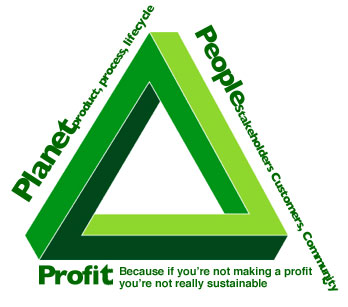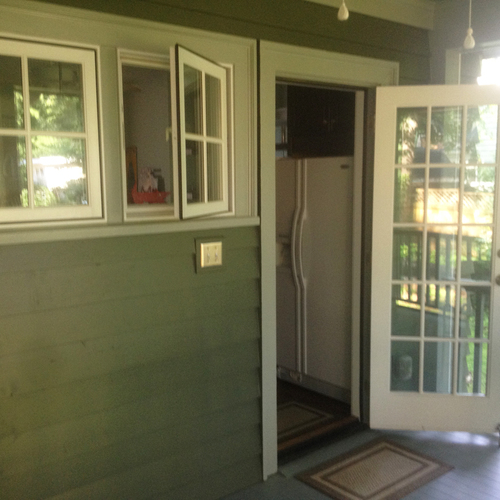
The number at the bottom of your balance sheet doesn’t tell the whole story about the success of your business.
As the green movement has evolved, it has been interesting and a little disheartening to see how many green businesses clearly “don’t get” the concept of sustainable business. Green Building is about stepping lightly on our planet. Sustainable Business principles focus on the triple bottom line of People, Planet and Profits, each holding equal importance in the way we manage our businesses.
The thing that really brought it home for me was the news that the defeat of a more energy-efficient building code at last September’s ICC hearings in Minneapolis was spearheaded by a major open-cell foam manufacturer and a major insulated glass manufacturer who felt that the more stringent guidelines would hurt their profitability. If there is an invisible hand at play in the market I hope that it’s aiming a swat at these companies right about now.
Workers are an important issue
At a green building class I taught in North Carolina last year I mentioned that I avoid the use of products from countries that tolerate an unsafe working environment and that I take the time to check the paperwork of my trade partners to be sure they have workers comp and don’t employ undocumented aliens. During lunch, a couple of the guys at my table complained that if it weren’t for uninsured illegal aliens they wouldn’t be able to build houses at all.
It’s about having integrity in what you build, but also in how you treat your workers and the greater community.
These are green builders and green building product suppliers letting profits get ahead of integrity and what’s good for their people and the planet. The lesson here is that just because you’re in the sustainable building business it doesn’t automatically follow that you are practicing sustainability in your business practices.
Sustainable business practices are what we used to call “right livelihood.” A set of principles by which we can make the way we earn our living be in harmony with the way we coexist ethically in the world. We can choose to deliberately balance the quest for profit with the good of our community, its people, the environment and the planet.
Profit is not a dirty word, it keeps you in business long enough to make a difference.
Profit is good, as my father used to say, “if you’re not making a profit your not really in business.” Without profit there is nothing to make payroll with or to cover warranty calls or send your kids and your employees’ kids to college. But it is profiting in harmony with your ethical commitments to your community and the planet that elevates business to sustainability.
This concept is not new, it’s a theme that is clearly part of the ancient Jewish texts the Pirkei Avot which discusses Tikkun Olam, our shared obligation to heal the world saying “you are not required to complete the work, yet you are not allowed to desist from it.” And the Bible carries the same theme when Peter staes “As each has received a gift, employ it for one another as good stewards of God’s varied grace.” It is at the very core of our shared ethical heritage the thread that holds our society together.
It turns out to be good for business too. This is not to say that scoundrels don’t prosper or that bad things don’t happen to good people. But there is an invisible hand in the market that does reward those that hold high integrity and ethical standards in their business practices. Those of us who treat our employees, as well as customers, with honesty and respect are generally served well by that. Increasingly the market rewards companies that look at the big picture in terms of life cycle costs and social and environmental impact associated with their products.
I like the triple bottom line graphic at the top of this post because it seems impossible and in many ways it is. Just when you think you have one part of your business in harmony with your ethics you discover that you are out of tune somewhere else. It took me twenty years to figure out how important the triple bottom line can be to my success, but it has served our small company well for the last ten.
And now it seems to be a movement.
Weekly Newsletter
Get building science and energy efficiency advice, plus special offers, in your inbox.















0 Comments
Log in or create an account to post a comment.
Sign up Log in